Organisational Behaviour Report: Individual, Team, and Organisation
VerifiedAdded on 2020/11/12
|14
|4296
|216
Report
AI Summary
This report provides a comprehensive analysis of organisational behaviour, focusing on its impact on individual and team performance within A David & Co Limited. It explores the influence of organizational culture, politics, and power dynamics, using Handy's cultural typology model to assess their effects. The report delves into motivation theories, particularly Vroom's expectancy theory and Herzberg's two-factor theory, to understand how management can effectively encourage employee dedication and achieve organizational goals. Furthermore, it contrasts effective and ineffective teams, highlighting the importance of employee involvement and communication. The report concludes by applying organizational concepts and philosophies to real-world scenarios, offering valuable insights into managing and optimizing organizational behaviour.
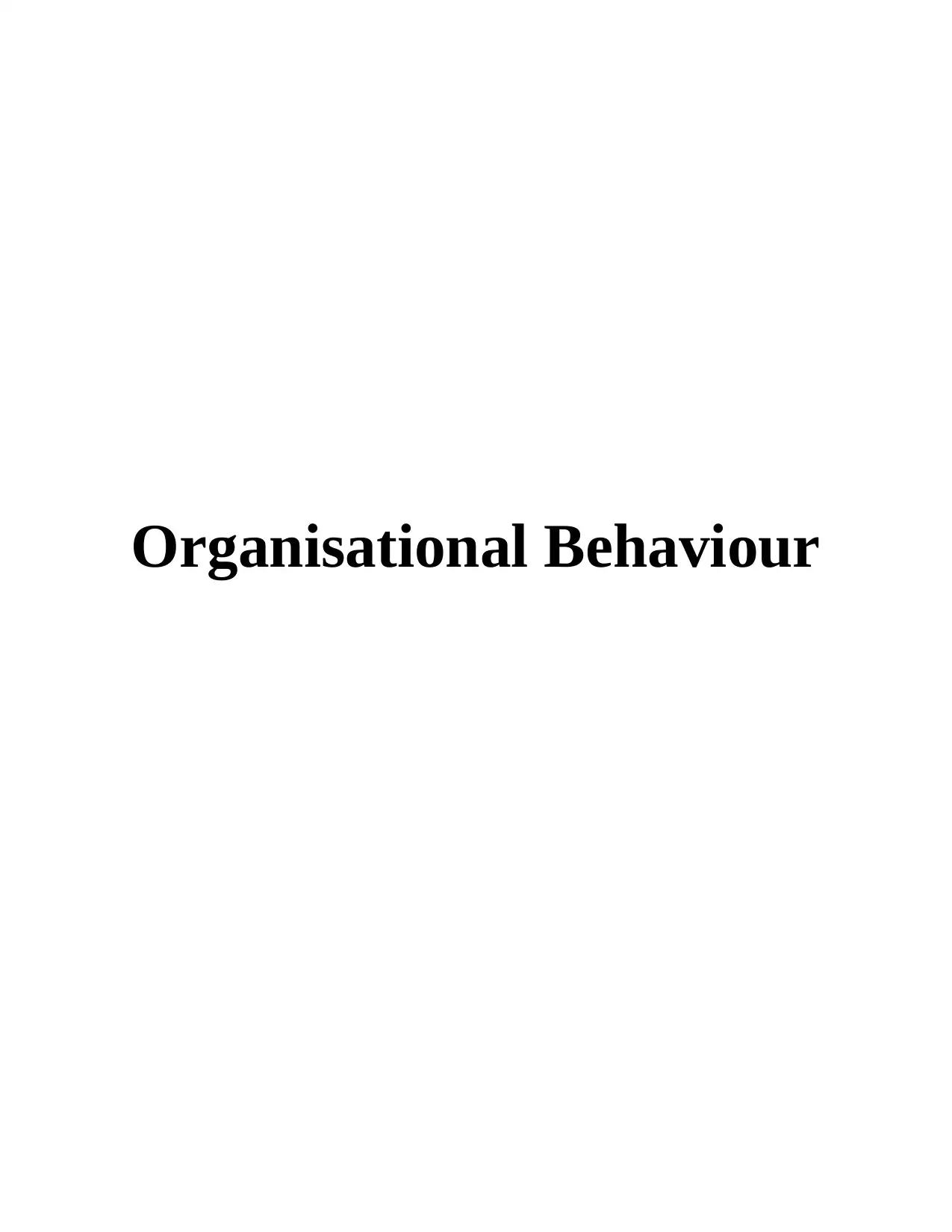
Organisational Behaviour
Paraphrase This Document
Need a fresh take? Get an instant paraphrase of this document with our AI Paraphraser
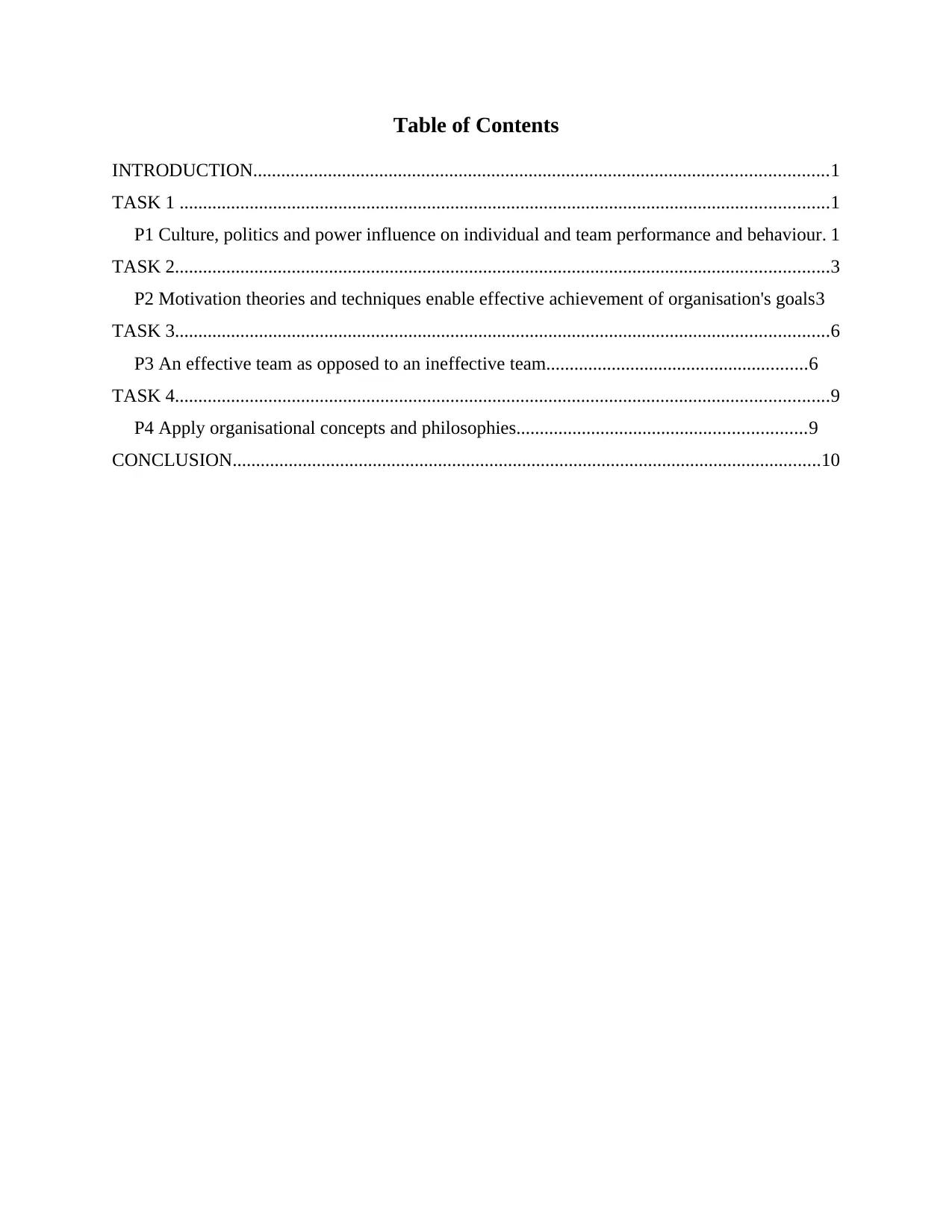
Table of Contents
INTRODUCTION...........................................................................................................................1
TASK 1 ...........................................................................................................................................1
P1 Culture, politics and power influence on individual and team performance and behaviour. 1
TASK 2............................................................................................................................................3
P2 Motivation theories and techniques enable effective achievement of organisation's goals3
TASK 3............................................................................................................................................6
P3 An effective team as opposed to an ineffective team........................................................6
TASK 4............................................................................................................................................9
P4 Apply organisational concepts and philosophies..............................................................9
CONCLUSION..............................................................................................................................10
INTRODUCTION...........................................................................................................................1
TASK 1 ...........................................................................................................................................1
P1 Culture, politics and power influence on individual and team performance and behaviour. 1
TASK 2............................................................................................................................................3
P2 Motivation theories and techniques enable effective achievement of organisation's goals3
TASK 3............................................................................................................................................6
P3 An effective team as opposed to an ineffective team........................................................6
TASK 4............................................................................................................................................9
P4 Apply organisational concepts and philosophies..............................................................9
CONCLUSION..............................................................................................................................10

⊘ This is a preview!⊘
Do you want full access?
Subscribe today to unlock all pages.

Trusted by 1+ million students worldwide
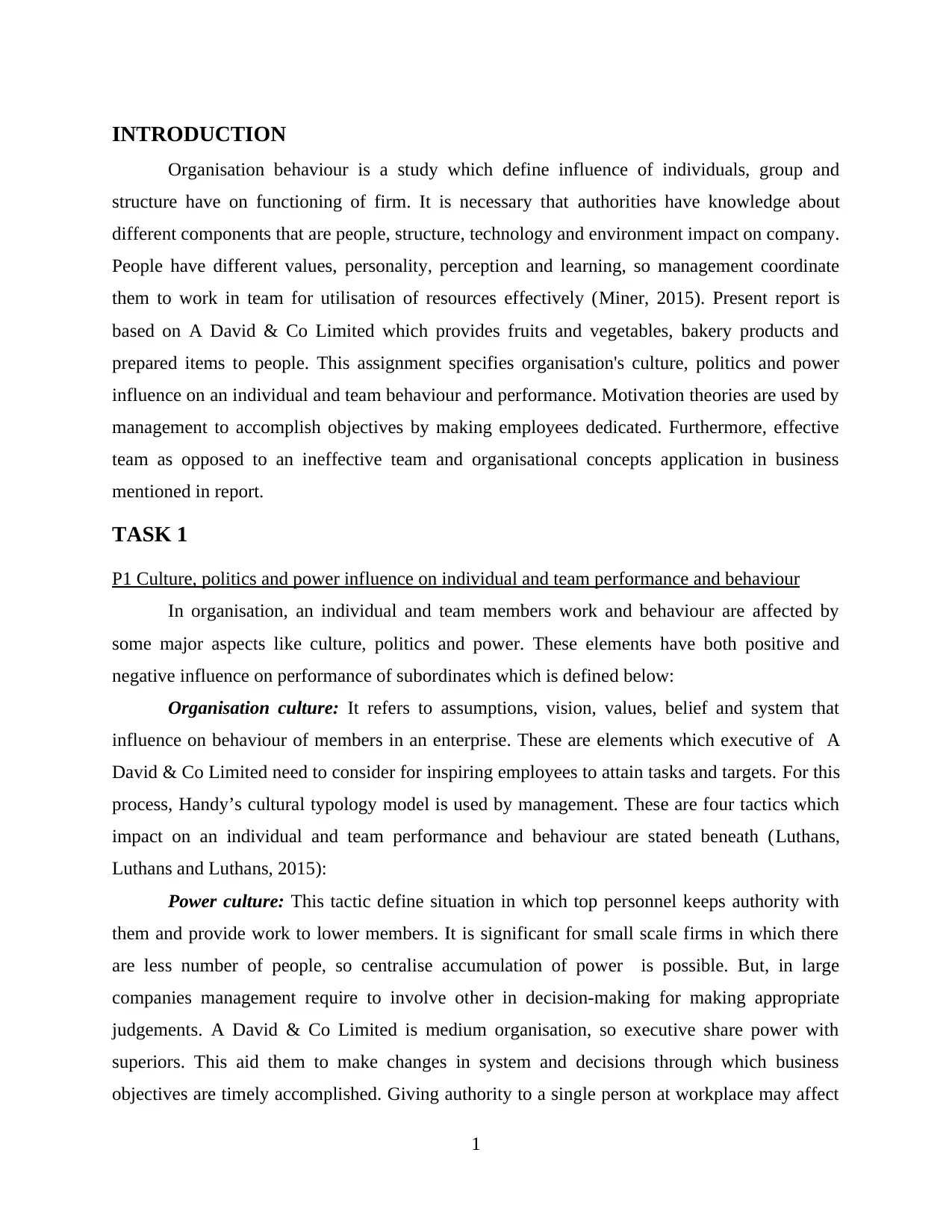
INTRODUCTION
Organisation behaviour is a study which define influence of individuals, group and
structure have on functioning of firm. It is necessary that authorities have knowledge about
different components that are people, structure, technology and environment impact on company.
People have different values, personality, perception and learning, so management coordinate
them to work in team for utilisation of resources effectively (Miner, 2015). Present report is
based on A David & Co Limited which provides fruits and vegetables, bakery products and
prepared items to people. This assignment specifies organisation's culture, politics and power
influence on an individual and team behaviour and performance. Motivation theories are used by
management to accomplish objectives by making employees dedicated. Furthermore, effective
team as opposed to an ineffective team and organisational concepts application in business
mentioned in report.
TASK 1
P1 Culture, politics and power influence on individual and team performance and behaviour
In organisation, an individual and team members work and behaviour are affected by
some major aspects like culture, politics and power. These elements have both positive and
negative influence on performance of subordinates which is defined below:
Organisation culture: It refers to assumptions, vision, values, belief and system that
influence on behaviour of members in an enterprise. These are elements which executive of A
David & Co Limited need to consider for inspiring employees to attain tasks and targets. For this
process, Handy’s cultural typology model is used by management. These are four tactics which
impact on an individual and team performance and behaviour are stated beneath (Luthans,
Luthans and Luthans, 2015):
Power culture: This tactic define situation in which top personnel keeps authority with
them and provide work to lower members. It is significant for small scale firms in which there
are less number of people, so centralise accumulation of power is possible. But, in large
companies management require to involve other in decision-making for making appropriate
judgements. A David & Co Limited is medium organisation, so executive share power with
superiors. This aid them to make changes in system and decisions through which business
objectives are timely accomplished. Giving authority to a single person at workplace may affect
1
Organisation behaviour is a study which define influence of individuals, group and
structure have on functioning of firm. It is necessary that authorities have knowledge about
different components that are people, structure, technology and environment impact on company.
People have different values, personality, perception and learning, so management coordinate
them to work in team for utilisation of resources effectively (Miner, 2015). Present report is
based on A David & Co Limited which provides fruits and vegetables, bakery products and
prepared items to people. This assignment specifies organisation's culture, politics and power
influence on an individual and team behaviour and performance. Motivation theories are used by
management to accomplish objectives by making employees dedicated. Furthermore, effective
team as opposed to an ineffective team and organisational concepts application in business
mentioned in report.
TASK 1
P1 Culture, politics and power influence on individual and team performance and behaviour
In organisation, an individual and team members work and behaviour are affected by
some major aspects like culture, politics and power. These elements have both positive and
negative influence on performance of subordinates which is defined below:
Organisation culture: It refers to assumptions, vision, values, belief and system that
influence on behaviour of members in an enterprise. These are elements which executive of A
David & Co Limited need to consider for inspiring employees to attain tasks and targets. For this
process, Handy’s cultural typology model is used by management. These are four tactics which
impact on an individual and team performance and behaviour are stated beneath (Luthans,
Luthans and Luthans, 2015):
Power culture: This tactic define situation in which top personnel keeps authority with
them and provide work to lower members. It is significant for small scale firms in which there
are less number of people, so centralise accumulation of power is possible. But, in large
companies management require to involve other in decision-making for making appropriate
judgements. A David & Co Limited is medium organisation, so executive share power with
superiors. This aid them to make changes in system and decisions through which business
objectives are timely accomplished. Giving authority to a single person at workplace may affect
1
Paraphrase This Document
Need a fresh take? Get an instant paraphrase of this document with our AI Paraphraser
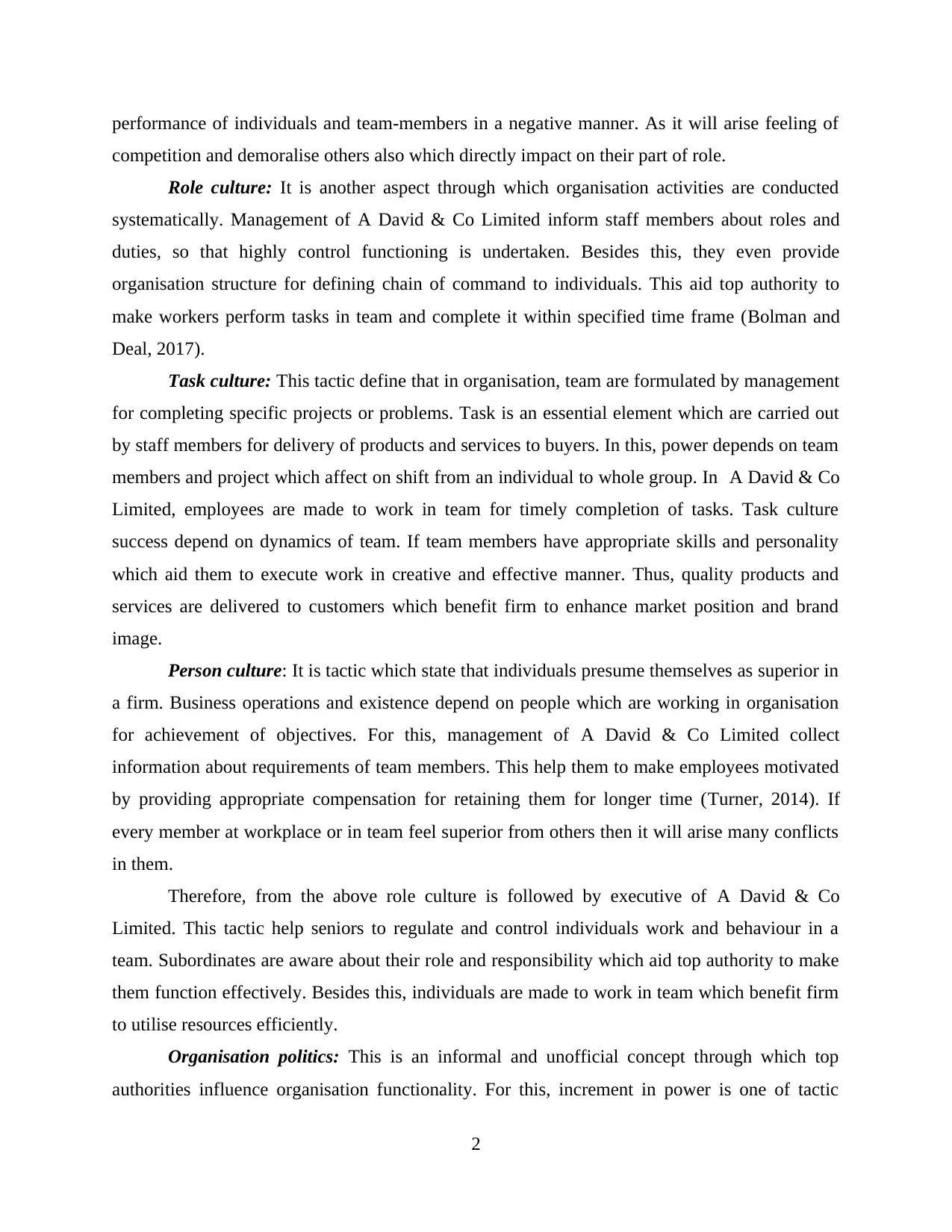
performance of individuals and team-members in a negative manner. As it will arise feeling of
competition and demoralise others also which directly impact on their part of role.
Role culture: It is another aspect through which organisation activities are conducted
systematically. Management of A David & Co Limited inform staff members about roles and
duties, so that highly control functioning is undertaken. Besides this, they even provide
organisation structure for defining chain of command to individuals. This aid top authority to
make workers perform tasks in team and complete it within specified time frame (Bolman and
Deal, 2017).
Task culture: This tactic define that in organisation, team are formulated by management
for completing specific projects or problems. Task is an essential element which are carried out
by staff members for delivery of products and services to buyers. In this, power depends on team
members and project which affect on shift from an individual to whole group. In A David & Co
Limited, employees are made to work in team for timely completion of tasks. Task culture
success depend on dynamics of team. If team members have appropriate skills and personality
which aid them to execute work in creative and effective manner. Thus, quality products and
services are delivered to customers which benefit firm to enhance market position and brand
image.
Person culture: It is tactic which state that individuals presume themselves as superior in
a firm. Business operations and existence depend on people which are working in organisation
for achievement of objectives. For this, management of A David & Co Limited collect
information about requirements of team members. This help them to make employees motivated
by providing appropriate compensation for retaining them for longer time (Turner, 2014). If
every member at workplace or in team feel superior from others then it will arise many conflicts
in them.
Therefore, from the above role culture is followed by executive of A David & Co
Limited. This tactic help seniors to regulate and control individuals work and behaviour in a
team. Subordinates are aware about their role and responsibility which aid top authority to make
them function effectively. Besides this, individuals are made to work in team which benefit firm
to utilise resources efficiently.
Organisation politics: This is an informal and unofficial concept through which top
authorities influence organisation functionality. For this, increment in power is one of tactic
2
competition and demoralise others also which directly impact on their part of role.
Role culture: It is another aspect through which organisation activities are conducted
systematically. Management of A David & Co Limited inform staff members about roles and
duties, so that highly control functioning is undertaken. Besides this, they even provide
organisation structure for defining chain of command to individuals. This aid top authority to
make workers perform tasks in team and complete it within specified time frame (Bolman and
Deal, 2017).
Task culture: This tactic define that in organisation, team are formulated by management
for completing specific projects or problems. Task is an essential element which are carried out
by staff members for delivery of products and services to buyers. In this, power depends on team
members and project which affect on shift from an individual to whole group. In A David & Co
Limited, employees are made to work in team for timely completion of tasks. Task culture
success depend on dynamics of team. If team members have appropriate skills and personality
which aid them to execute work in creative and effective manner. Thus, quality products and
services are delivered to customers which benefit firm to enhance market position and brand
image.
Person culture: It is tactic which state that individuals presume themselves as superior in
a firm. Business operations and existence depend on people which are working in organisation
for achievement of objectives. For this, management of A David & Co Limited collect
information about requirements of team members. This help them to make employees motivated
by providing appropriate compensation for retaining them for longer time (Turner, 2014). If
every member at workplace or in team feel superior from others then it will arise many conflicts
in them.
Therefore, from the above role culture is followed by executive of A David & Co
Limited. This tactic help seniors to regulate and control individuals work and behaviour in a
team. Subordinates are aware about their role and responsibility which aid top authority to make
them function effectively. Besides this, individuals are made to work in team which benefit firm
to utilise resources efficiently.
Organisation politics: This is an informal and unofficial concept through which top
authorities influence organisation functionality. For this, increment in power is one of tactic
2
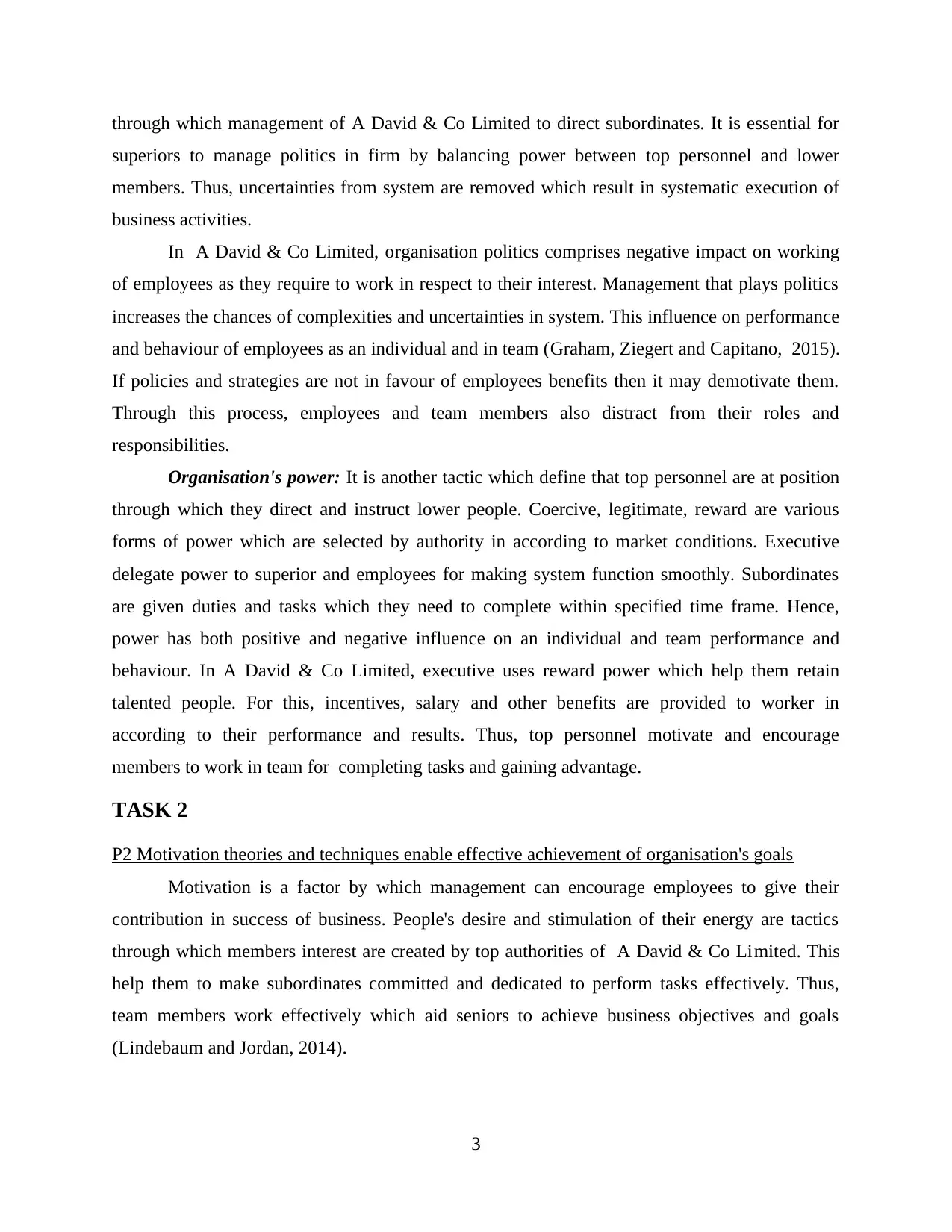
through which management of A David & Co Limited to direct subordinates. It is essential for
superiors to manage politics in firm by balancing power between top personnel and lower
members. Thus, uncertainties from system are removed which result in systematic execution of
business activities.
In A David & Co Limited, organisation politics comprises negative impact on working
of employees as they require to work in respect to their interest. Management that plays politics
increases the chances of complexities and uncertainties in system. This influence on performance
and behaviour of employees as an individual and in team (Graham, Ziegert and Capitano, 2015).
If policies and strategies are not in favour of employees benefits then it may demotivate them.
Through this process, employees and team members also distract from their roles and
responsibilities.
Organisation's power: It is another tactic which define that top personnel are at position
through which they direct and instruct lower people. Coercive, legitimate, reward are various
forms of power which are selected by authority in according to market conditions. Executive
delegate power to superior and employees for making system function smoothly. Subordinates
are given duties and tasks which they need to complete within specified time frame. Hence,
power has both positive and negative influence on an individual and team performance and
behaviour. In A David & Co Limited, executive uses reward power which help them retain
talented people. For this, incentives, salary and other benefits are provided to worker in
according to their performance and results. Thus, top personnel motivate and encourage
members to work in team for completing tasks and gaining advantage.
TASK 2
P2 Motivation theories and techniques enable effective achievement of organisation's goals
Motivation is a factor by which management can encourage employees to give their
contribution in success of business. People's desire and stimulation of their energy are tactics
through which members interest are created by top authorities of A David & Co Limited. This
help them to make subordinates committed and dedicated to perform tasks effectively. Thus,
team members work effectively which aid seniors to achieve business objectives and goals
(Lindebaum and Jordan, 2014).
3
superiors to manage politics in firm by balancing power between top personnel and lower
members. Thus, uncertainties from system are removed which result in systematic execution of
business activities.
In A David & Co Limited, organisation politics comprises negative impact on working
of employees as they require to work in respect to their interest. Management that plays politics
increases the chances of complexities and uncertainties in system. This influence on performance
and behaviour of employees as an individual and in team (Graham, Ziegert and Capitano, 2015).
If policies and strategies are not in favour of employees benefits then it may demotivate them.
Through this process, employees and team members also distract from their roles and
responsibilities.
Organisation's power: It is another tactic which define that top personnel are at position
through which they direct and instruct lower people. Coercive, legitimate, reward are various
forms of power which are selected by authority in according to market conditions. Executive
delegate power to superior and employees for making system function smoothly. Subordinates
are given duties and tasks which they need to complete within specified time frame. Hence,
power has both positive and negative influence on an individual and team performance and
behaviour. In A David & Co Limited, executive uses reward power which help them retain
talented people. For this, incentives, salary and other benefits are provided to worker in
according to their performance and results. Thus, top personnel motivate and encourage
members to work in team for completing tasks and gaining advantage.
TASK 2
P2 Motivation theories and techniques enable effective achievement of organisation's goals
Motivation is a factor by which management can encourage employees to give their
contribution in success of business. People's desire and stimulation of their energy are tactics
through which members interest are created by top authorities of A David & Co Limited. This
help them to make subordinates committed and dedicated to perform tasks effectively. Thus,
team members work effectively which aid seniors to achieve business objectives and goals
(Lindebaum and Jordan, 2014).
3
⊘ This is a preview!⊘
Do you want full access?
Subscribe today to unlock all pages.

Trusted by 1+ million students worldwide
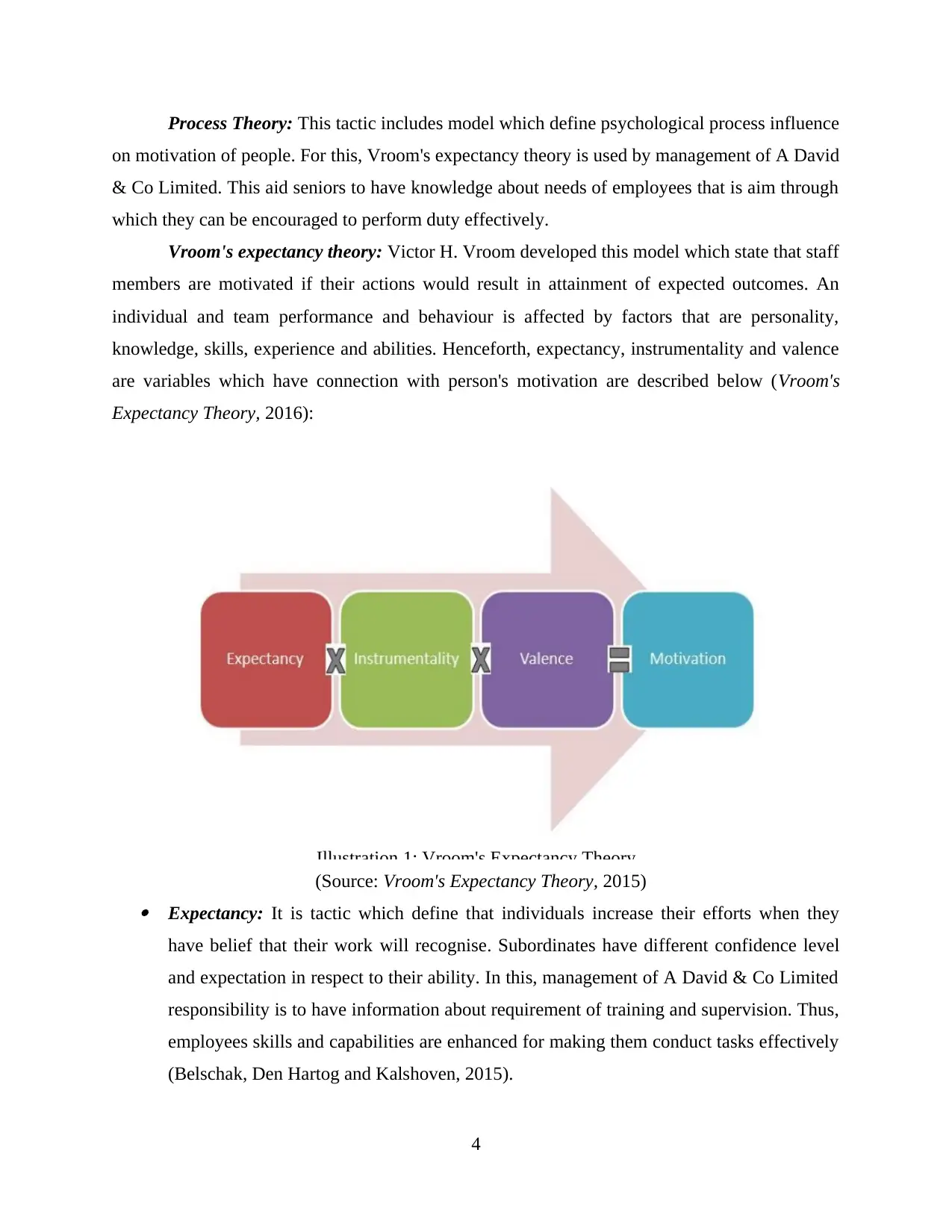
Process Theory: This tactic includes model which define psychological process influence
on motivation of people. For this, Vroom's expectancy theory is used by management of A David
& Co Limited. This aid seniors to have knowledge about needs of employees that is aim through
which they can be encouraged to perform duty effectively.
Vroom's expectancy theory: Victor H. Vroom developed this model which state that staff
members are motivated if their actions would result in attainment of expected outcomes. An
individual and team performance and behaviour is affected by factors that are personality,
knowledge, skills, experience and abilities. Henceforth, expectancy, instrumentality and valence
are variables which have connection with person's motivation are described below (Vroom's
Expectancy Theory, 2016):
(Source: Vroom's Expectancy Theory, 2015) Expectancy: It is tactic which define that individuals increase their efforts when they
have belief that their work will recognise. Subordinates have different confidence level
and expectation in respect to their ability. In this, management of A David & Co Limited
responsibility is to have information about requirement of training and supervision. Thus,
employees skills and capabilities are enhanced for making them conduct tasks effectively
(Belschak, Den Hartog and Kalshoven, 2015).
4
Illustration 1: Vroom's Expectancy Theory
on motivation of people. For this, Vroom's expectancy theory is used by management of A David
& Co Limited. This aid seniors to have knowledge about needs of employees that is aim through
which they can be encouraged to perform duty effectively.
Vroom's expectancy theory: Victor H. Vroom developed this model which state that staff
members are motivated if their actions would result in attainment of expected outcomes. An
individual and team performance and behaviour is affected by factors that are personality,
knowledge, skills, experience and abilities. Henceforth, expectancy, instrumentality and valence
are variables which have connection with person's motivation are described below (Vroom's
Expectancy Theory, 2016):
(Source: Vroom's Expectancy Theory, 2015) Expectancy: It is tactic which define that individuals increase their efforts when they
have belief that their work will recognise. Subordinates have different confidence level
and expectation in respect to their ability. In this, management of A David & Co Limited
responsibility is to have information about requirement of training and supervision. Thus,
employees skills and capabilities are enhanced for making them conduct tasks effectively
(Belschak, Den Hartog and Kalshoven, 2015).
4
Illustration 1: Vroom's Expectancy Theory
Paraphrase This Document
Need a fresh take? Get an instant paraphrase of this document with our AI Paraphraser
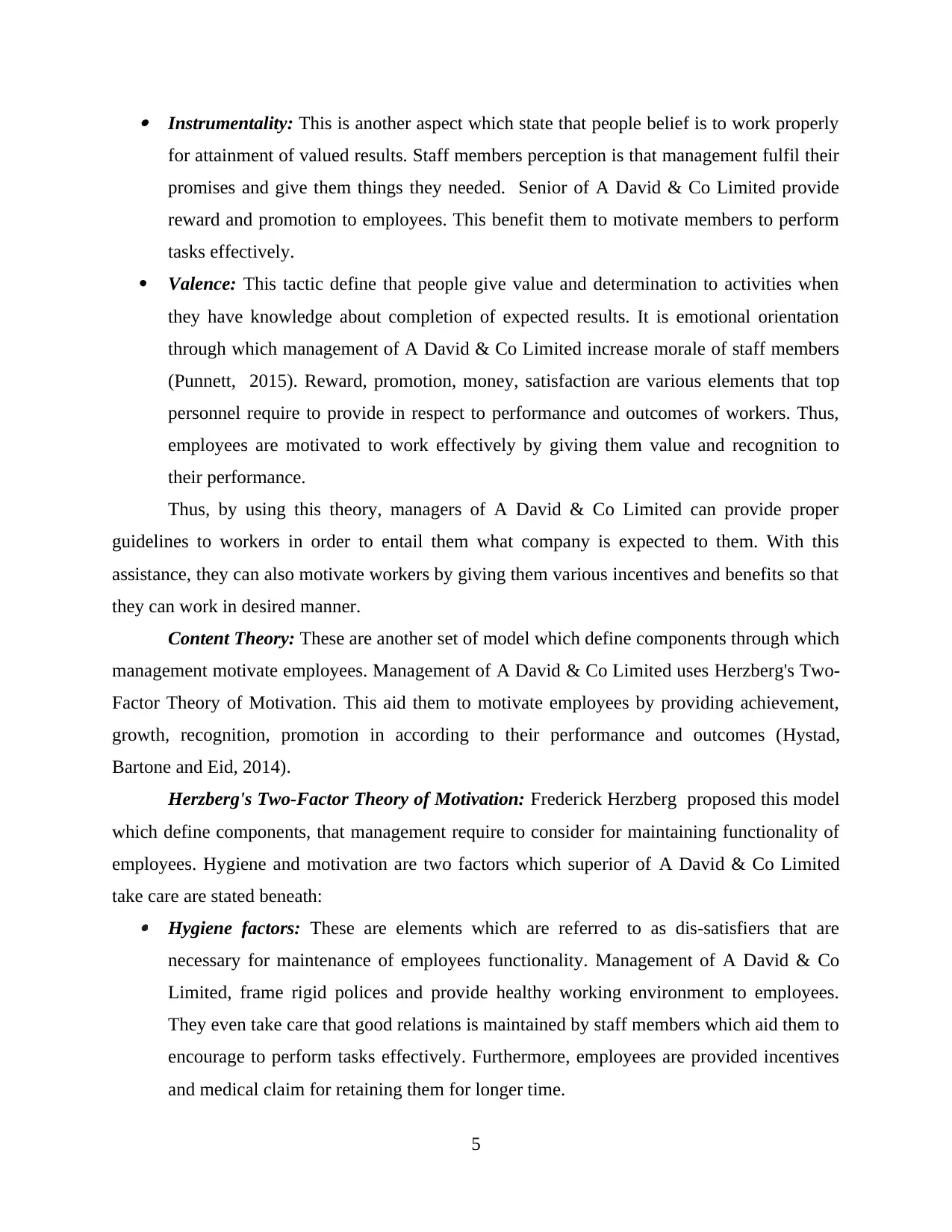
Instrumentality: This is another aspect which state that people belief is to work properly
for attainment of valued results. Staff members perception is that management fulfil their
promises and give them things they needed. Senior of A David & Co Limited provide
reward and promotion to employees. This benefit them to motivate members to perform
tasks effectively.
Valence: This tactic define that people give value and determination to activities when
they have knowledge about completion of expected results. It is emotional orientation
through which management of A David & Co Limited increase morale of staff members
(Punnett, 2015). Reward, promotion, money, satisfaction are various elements that top
personnel require to provide in respect to performance and outcomes of workers. Thus,
employees are motivated to work effectively by giving them value and recognition to
their performance.
Thus, by using this theory, managers of A David & Co Limited can provide proper
guidelines to workers in order to entail them what company is expected to them. With this
assistance, they can also motivate workers by giving them various incentives and benefits so that
they can work in desired manner.
Content Theory: These are another set of model which define components through which
management motivate employees. Management of A David & Co Limited uses Herzberg's Two-
Factor Theory of Motivation. This aid them to motivate employees by providing achievement,
growth, recognition, promotion in according to their performance and outcomes (Hystad,
Bartone and Eid, 2014).
Herzberg's Two-Factor Theory of Motivation: Frederick Herzberg proposed this model
which define components, that management require to consider for maintaining functionality of
employees. Hygiene and motivation are two factors which superior of A David & Co Limited
take care are stated beneath: Hygiene factors: These are elements which are referred to as dis-satisfiers that are
necessary for maintenance of employees functionality. Management of A David & Co
Limited, frame rigid polices and provide healthy working environment to employees.
They even take care that good relations is maintained by staff members which aid them to
encourage to perform tasks effectively. Furthermore, employees are provided incentives
and medical claim for retaining them for longer time.
5
for attainment of valued results. Staff members perception is that management fulfil their
promises and give them things they needed. Senior of A David & Co Limited provide
reward and promotion to employees. This benefit them to motivate members to perform
tasks effectively.
Valence: This tactic define that people give value and determination to activities when
they have knowledge about completion of expected results. It is emotional orientation
through which management of A David & Co Limited increase morale of staff members
(Punnett, 2015). Reward, promotion, money, satisfaction are various elements that top
personnel require to provide in respect to performance and outcomes of workers. Thus,
employees are motivated to work effectively by giving them value and recognition to
their performance.
Thus, by using this theory, managers of A David & Co Limited can provide proper
guidelines to workers in order to entail them what company is expected to them. With this
assistance, they can also motivate workers by giving them various incentives and benefits so that
they can work in desired manner.
Content Theory: These are another set of model which define components through which
management motivate employees. Management of A David & Co Limited uses Herzberg's Two-
Factor Theory of Motivation. This aid them to motivate employees by providing achievement,
growth, recognition, promotion in according to their performance and outcomes (Hystad,
Bartone and Eid, 2014).
Herzberg's Two-Factor Theory of Motivation: Frederick Herzberg proposed this model
which define components, that management require to consider for maintaining functionality of
employees. Hygiene and motivation are two factors which superior of A David & Co Limited
take care are stated beneath: Hygiene factors: These are elements which are referred to as dis-satisfiers that are
necessary for maintenance of employees functionality. Management of A David & Co
Limited, frame rigid polices and provide healthy working environment to employees.
They even take care that good relations is maintained by staff members which aid them to
encourage to perform tasks effectively. Furthermore, employees are provided incentives
and medical claim for retaining them for longer time.
5
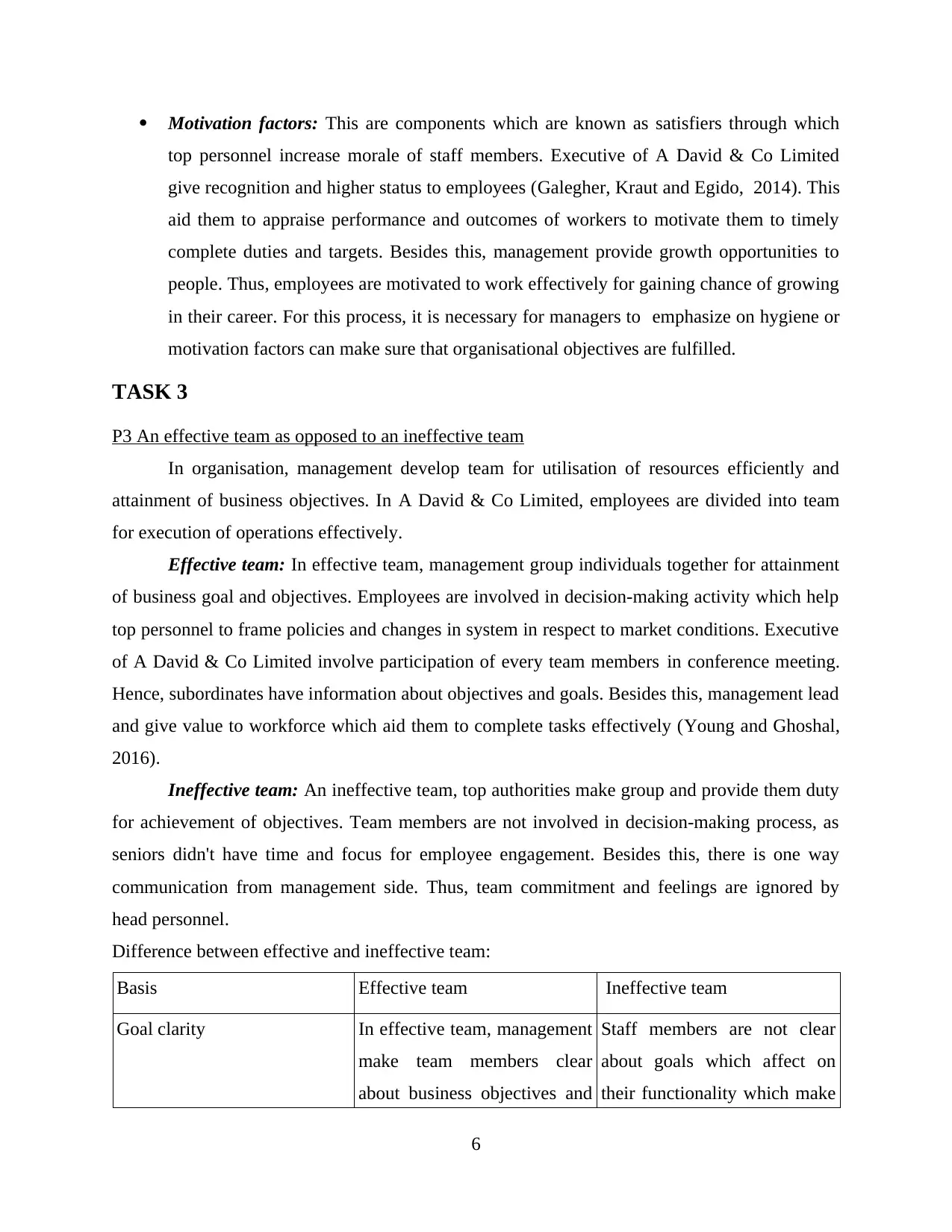
Motivation factors: This are components which are known as satisfiers through which
top personnel increase morale of staff members. Executive of A David & Co Limited
give recognition and higher status to employees (Galegher, Kraut and Egido, 2014). This
aid them to appraise performance and outcomes of workers to motivate them to timely
complete duties and targets. Besides this, management provide growth opportunities to
people. Thus, employees are motivated to work effectively for gaining chance of growing
in their career. For this process, it is necessary for managers to emphasize on hygiene or
motivation factors can make sure that organisational objectives are fulfilled.
TASK 3
P3 An effective team as opposed to an ineffective team
In organisation, management develop team for utilisation of resources efficiently and
attainment of business objectives. In A David & Co Limited, employees are divided into team
for execution of operations effectively.
Effective team: In effective team, management group individuals together for attainment
of business goal and objectives. Employees are involved in decision-making activity which help
top personnel to frame policies and changes in system in respect to market conditions. Executive
of A David & Co Limited involve participation of every team members in conference meeting.
Hence, subordinates have information about objectives and goals. Besides this, management lead
and give value to workforce which aid them to complete tasks effectively (Young and Ghoshal,
2016).
Ineffective team: An ineffective team, top authorities make group and provide them duty
for achievement of objectives. Team members are not involved in decision-making process, as
seniors didn't have time and focus for employee engagement. Besides this, there is one way
communication from management side. Thus, team commitment and feelings are ignored by
head personnel.
Difference between effective and ineffective team:
Basis Effective team Ineffective team
Goal clarity In effective team, management
make team members clear
about business objectives and
Staff members are not clear
about goals which affect on
their functionality which make
6
top personnel increase morale of staff members. Executive of A David & Co Limited
give recognition and higher status to employees (Galegher, Kraut and Egido, 2014). This
aid them to appraise performance and outcomes of workers to motivate them to timely
complete duties and targets. Besides this, management provide growth opportunities to
people. Thus, employees are motivated to work effectively for gaining chance of growing
in their career. For this process, it is necessary for managers to emphasize on hygiene or
motivation factors can make sure that organisational objectives are fulfilled.
TASK 3
P3 An effective team as opposed to an ineffective team
In organisation, management develop team for utilisation of resources efficiently and
attainment of business objectives. In A David & Co Limited, employees are divided into team
for execution of operations effectively.
Effective team: In effective team, management group individuals together for attainment
of business goal and objectives. Employees are involved in decision-making activity which help
top personnel to frame policies and changes in system in respect to market conditions. Executive
of A David & Co Limited involve participation of every team members in conference meeting.
Hence, subordinates have information about objectives and goals. Besides this, management lead
and give value to workforce which aid them to complete tasks effectively (Young and Ghoshal,
2016).
Ineffective team: An ineffective team, top authorities make group and provide them duty
for achievement of objectives. Team members are not involved in decision-making process, as
seniors didn't have time and focus for employee engagement. Besides this, there is one way
communication from management side. Thus, team commitment and feelings are ignored by
head personnel.
Difference between effective and ineffective team:
Basis Effective team Ineffective team
Goal clarity In effective team, management
make team members clear
about business objectives and
Staff members are not clear
about goals which affect on
their functionality which make
6
⊘ This is a preview!⊘
Do you want full access?
Subscribe today to unlock all pages.

Trusted by 1+ million students worldwide
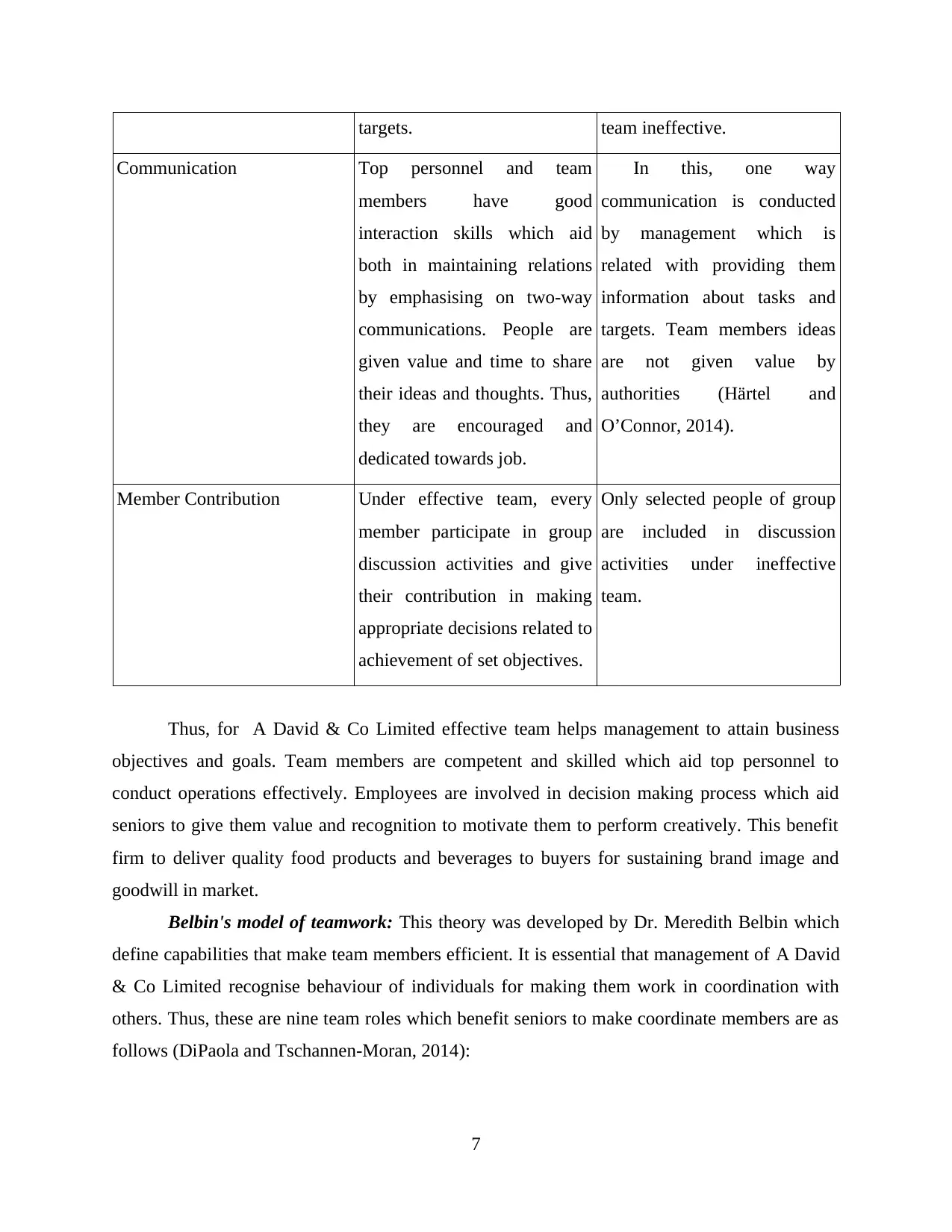
targets. team ineffective.
Communication Top personnel and team
members have good
interaction skills which aid
both in maintaining relations
by emphasising on two-way
communications. People are
given value and time to share
their ideas and thoughts. Thus,
they are encouraged and
dedicated towards job.
In this, one way
communication is conducted
by management which is
related with providing them
information about tasks and
targets. Team members ideas
are not given value by
authorities (Härtel and
O’Connor, 2014).
Member Contribution Under effective team, every
member participate in group
discussion activities and give
their contribution in making
appropriate decisions related to
achievement of set objectives.
Only selected people of group
are included in discussion
activities under ineffective
team.
Thus, for A David & Co Limited effective team helps management to attain business
objectives and goals. Team members are competent and skilled which aid top personnel to
conduct operations effectively. Employees are involved in decision making process which aid
seniors to give them value and recognition to motivate them to perform creatively. This benefit
firm to deliver quality food products and beverages to buyers for sustaining brand image and
goodwill in market.
Belbin's model of teamwork: This theory was developed by Dr. Meredith Belbin which
define capabilities that make team members efficient. It is essential that management of A David
& Co Limited recognise behaviour of individuals for making them work in coordination with
others. Thus, these are nine team roles which benefit seniors to make coordinate members are as
follows (DiPaola and Tschannen-Moran, 2014):
7
Communication Top personnel and team
members have good
interaction skills which aid
both in maintaining relations
by emphasising on two-way
communications. People are
given value and time to share
their ideas and thoughts. Thus,
they are encouraged and
dedicated towards job.
In this, one way
communication is conducted
by management which is
related with providing them
information about tasks and
targets. Team members ideas
are not given value by
authorities (Härtel and
O’Connor, 2014).
Member Contribution Under effective team, every
member participate in group
discussion activities and give
their contribution in making
appropriate decisions related to
achievement of set objectives.
Only selected people of group
are included in discussion
activities under ineffective
team.
Thus, for A David & Co Limited effective team helps management to attain business
objectives and goals. Team members are competent and skilled which aid top personnel to
conduct operations effectively. Employees are involved in decision making process which aid
seniors to give them value and recognition to motivate them to perform creatively. This benefit
firm to deliver quality food products and beverages to buyers for sustaining brand image and
goodwill in market.
Belbin's model of teamwork: This theory was developed by Dr. Meredith Belbin which
define capabilities that make team members efficient. It is essential that management of A David
& Co Limited recognise behaviour of individuals for making them work in coordination with
others. Thus, these are nine team roles which benefit seniors to make coordinate members are as
follows (DiPaola and Tschannen-Moran, 2014):
7
Paraphrase This Document
Need a fresh take? Get an instant paraphrase of this document with our AI Paraphraser
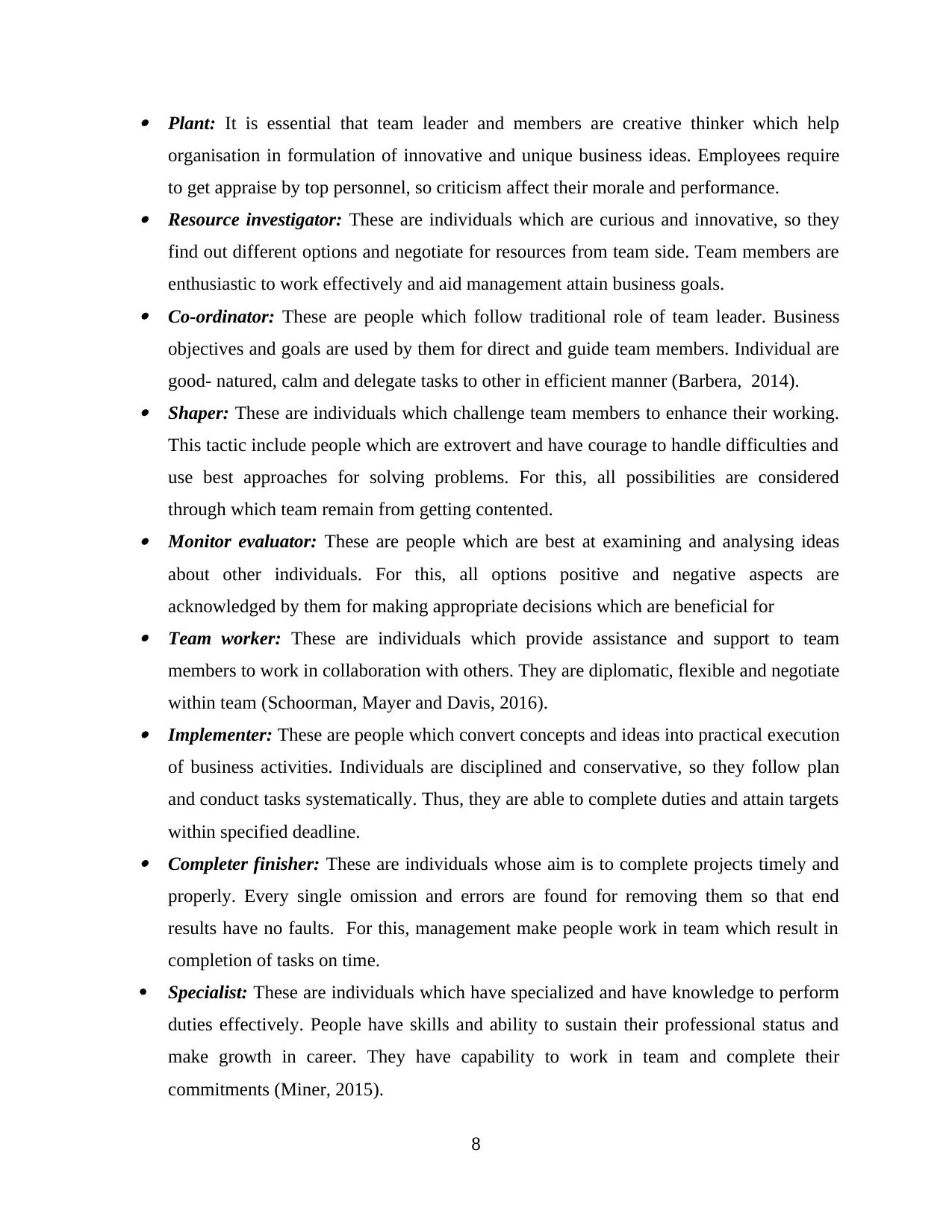
Plant: It is essential that team leader and members are creative thinker which help
organisation in formulation of innovative and unique business ideas. Employees require
to get appraise by top personnel, so criticism affect their morale and performance. Resource investigator: These are individuals which are curious and innovative, so they
find out different options and negotiate for resources from team side. Team members are
enthusiastic to work effectively and aid management attain business goals. Co-ordinator: These are people which follow traditional role of team leader. Business
objectives and goals are used by them for direct and guide team members. Individual are
good- natured, calm and delegate tasks to other in efficient manner (Barbera, 2014). Shaper: These are individuals which challenge team members to enhance their working.
This tactic include people which are extrovert and have courage to handle difficulties and
use best approaches for solving problems. For this, all possibilities are considered
through which team remain from getting contented. Monitor evaluator: These are people which are best at examining and analysing ideas
about other individuals. For this, all options positive and negative aspects are
acknowledged by them for making appropriate decisions which are beneficial for Team worker: These are individuals which provide assistance and support to team
members to work in collaboration with others. They are diplomatic, flexible and negotiate
within team (Schoorman, Mayer and Davis, 2016). Implementer: These are people which convert concepts and ideas into practical execution
of business activities. Individuals are disciplined and conservative, so they follow plan
and conduct tasks systematically. Thus, they are able to complete duties and attain targets
within specified deadline. Completer finisher: These are individuals whose aim is to complete projects timely and
properly. Every single omission and errors are found for removing them so that end
results have no faults. For this, management make people work in team which result in
completion of tasks on time.
Specialist: These are individuals which have specialized and have knowledge to perform
duties effectively. People have skills and ability to sustain their professional status and
make growth in career. They have capability to work in team and complete their
commitments (Miner, 2015).
8
organisation in formulation of innovative and unique business ideas. Employees require
to get appraise by top personnel, so criticism affect their morale and performance. Resource investigator: These are individuals which are curious and innovative, so they
find out different options and negotiate for resources from team side. Team members are
enthusiastic to work effectively and aid management attain business goals. Co-ordinator: These are people which follow traditional role of team leader. Business
objectives and goals are used by them for direct and guide team members. Individual are
good- natured, calm and delegate tasks to other in efficient manner (Barbera, 2014). Shaper: These are individuals which challenge team members to enhance their working.
This tactic include people which are extrovert and have courage to handle difficulties and
use best approaches for solving problems. For this, all possibilities are considered
through which team remain from getting contented. Monitor evaluator: These are people which are best at examining and analysing ideas
about other individuals. For this, all options positive and negative aspects are
acknowledged by them for making appropriate decisions which are beneficial for Team worker: These are individuals which provide assistance and support to team
members to work in collaboration with others. They are diplomatic, flexible and negotiate
within team (Schoorman, Mayer and Davis, 2016). Implementer: These are people which convert concepts and ideas into practical execution
of business activities. Individuals are disciplined and conservative, so they follow plan
and conduct tasks systematically. Thus, they are able to complete duties and attain targets
within specified deadline. Completer finisher: These are individuals whose aim is to complete projects timely and
properly. Every single omission and errors are found for removing them so that end
results have no faults. For this, management make people work in team which result in
completion of tasks on time.
Specialist: These are individuals which have specialized and have knowledge to perform
duties effectively. People have skills and ability to sustain their professional status and
make growth in career. They have capability to work in team and complete their
commitments (Miner, 2015).
8
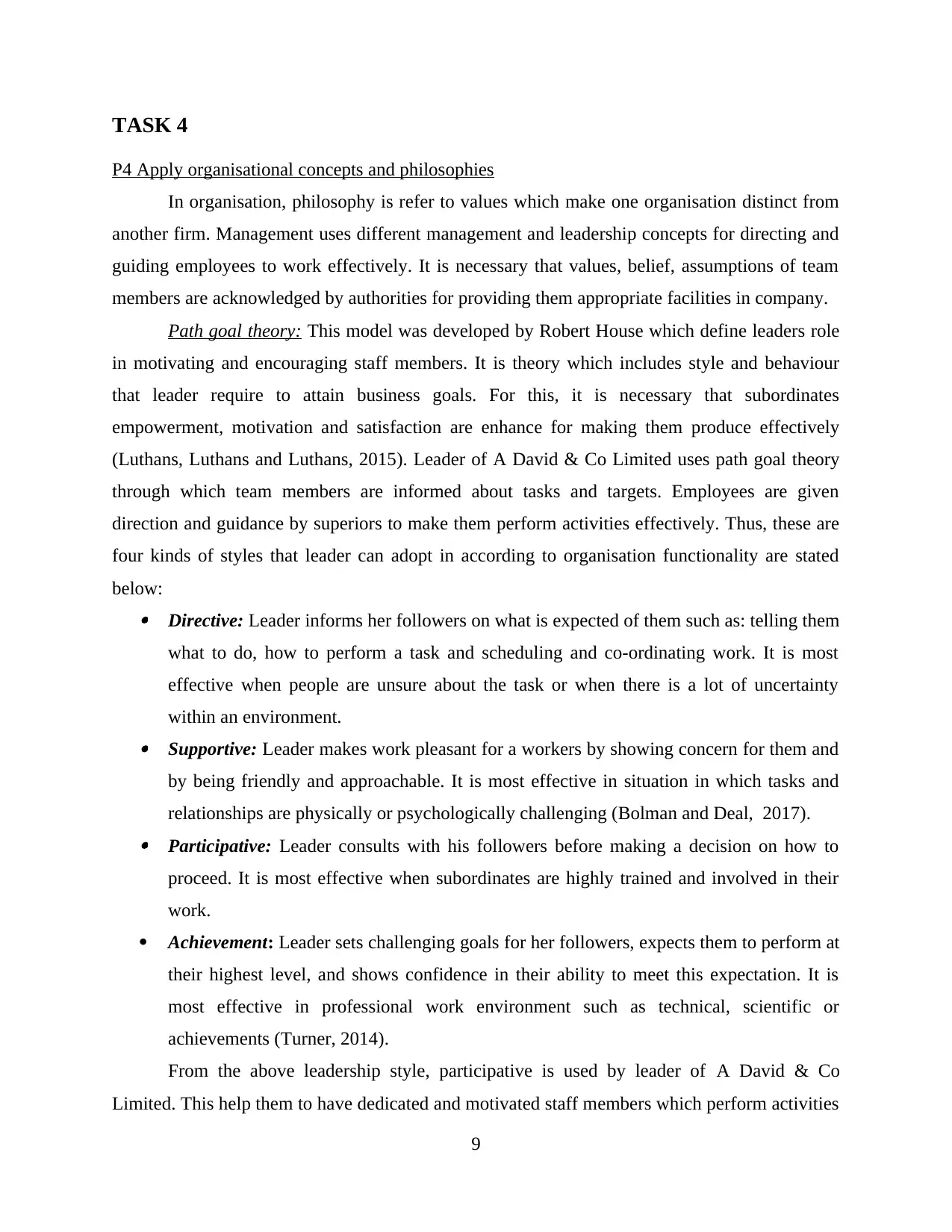
TASK 4
P4 Apply organisational concepts and philosophies
In organisation, philosophy is refer to values which make one organisation distinct from
another firm. Management uses different management and leadership concepts for directing and
guiding employees to work effectively. It is necessary that values, belief, assumptions of team
members are acknowledged by authorities for providing them appropriate facilities in company.
Path goal theory: This model was developed by Robert House which define leaders role
in motivating and encouraging staff members. It is theory which includes style and behaviour
that leader require to attain business goals. For this, it is necessary that subordinates
empowerment, motivation and satisfaction are enhance for making them produce effectively
(Luthans, Luthans and Luthans, 2015). Leader of A David & Co Limited uses path goal theory
through which team members are informed about tasks and targets. Employees are given
direction and guidance by superiors to make them perform activities effectively. Thus, these are
four kinds of styles that leader can adopt in according to organisation functionality are stated
below: Directive: Leader informs her followers on what is expected of them such as: telling them
what to do, how to perform a task and scheduling and co-ordinating work. It is most
effective when people are unsure about the task or when there is a lot of uncertainty
within an environment. Supportive: Leader makes work pleasant for a workers by showing concern for them and
by being friendly and approachable. It is most effective in situation in which tasks and
relationships are physically or psychologically challenging (Bolman and Deal, 2017). Participative: Leader consults with his followers before making a decision on how to
proceed. It is most effective when subordinates are highly trained and involved in their
work.
Achievement: Leader sets challenging goals for her followers, expects them to perform at
their highest level, and shows confidence in their ability to meet this expectation. It is
most effective in professional work environment such as technical, scientific or
achievements (Turner, 2014).
From the above leadership style, participative is used by leader of A David & Co
Limited. This help them to have dedicated and motivated staff members which perform activities
9
P4 Apply organisational concepts and philosophies
In organisation, philosophy is refer to values which make one organisation distinct from
another firm. Management uses different management and leadership concepts for directing and
guiding employees to work effectively. It is necessary that values, belief, assumptions of team
members are acknowledged by authorities for providing them appropriate facilities in company.
Path goal theory: This model was developed by Robert House which define leaders role
in motivating and encouraging staff members. It is theory which includes style and behaviour
that leader require to attain business goals. For this, it is necessary that subordinates
empowerment, motivation and satisfaction are enhance for making them produce effectively
(Luthans, Luthans and Luthans, 2015). Leader of A David & Co Limited uses path goal theory
through which team members are informed about tasks and targets. Employees are given
direction and guidance by superiors to make them perform activities effectively. Thus, these are
four kinds of styles that leader can adopt in according to organisation functionality are stated
below: Directive: Leader informs her followers on what is expected of them such as: telling them
what to do, how to perform a task and scheduling and co-ordinating work. It is most
effective when people are unsure about the task or when there is a lot of uncertainty
within an environment. Supportive: Leader makes work pleasant for a workers by showing concern for them and
by being friendly and approachable. It is most effective in situation in which tasks and
relationships are physically or psychologically challenging (Bolman and Deal, 2017). Participative: Leader consults with his followers before making a decision on how to
proceed. It is most effective when subordinates are highly trained and involved in their
work.
Achievement: Leader sets challenging goals for her followers, expects them to perform at
their highest level, and shows confidence in their ability to meet this expectation. It is
most effective in professional work environment such as technical, scientific or
achievements (Turner, 2014).
From the above leadership style, participative is used by leader of A David & Co
Limited. This help them to have dedicated and motivated staff members which perform activities
9
⊘ This is a preview!⊘
Do you want full access?
Subscribe today to unlock all pages.

Trusted by 1+ million students worldwide
1 out of 14
Related Documents
Your All-in-One AI-Powered Toolkit for Academic Success.
+13062052269
info@desklib.com
Available 24*7 on WhatsApp / Email
![[object Object]](/_next/static/media/star-bottom.7253800d.svg)
Unlock your academic potential
Copyright © 2020–2026 A2Z Services. All Rights Reserved. Developed and managed by ZUCOL.





